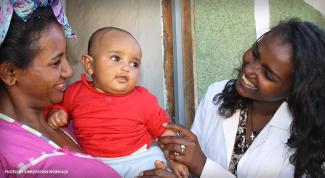BACKGROUND
Ethiopia has achieved major health improvements over the past decade. However, ensuring access to good quality healthcare for over 110 million Ethiopians remains a challenge. Infectious disease, lack of safe water, sanitation and hygiene, and malnutrition continue to threaten the gains made in health outcomes. To this end, USAID partners with Ethiopia to strengthen the capacity of doctors, care providers, and community extension workers. We focus on enhancing policy and financing to help expand access to more efficient and equitable health services with a focus on poor communities. USAID also seeks to empower communities to take ownership of their health and nutrition, driving a cycle of accountable and responsive healthcare.
Through USAID, the United States is committed to reducing the transmission of diseases, promoting health as a basic right, saving lives, and working with Ethiopia to help families achieve a healthier and more prosperous future for themselves. The U.S. Government is the largest donor in the Ethiopian health sector, where over the past 20 years, the United States’ long-term investments amount to more than $13 billion in overall assistance, with nearly $4 billion in health alone. This has contributed to significant reductions in maternal and child mortality—which have declined by 50 percent and 66 percent respectively since 1990—as well as declines in diseases like malaria, TB, and HIV/AIDS.
PRIORITIES
Family Health. In underserved areas and those affected by drought, conflict and disease outbreaks, USAID invests in high impact interventions to achieve better maternal and child health outcomes. These interventions include building the capacity of healthcare workers to deliver quality reproductive, maternal, newborn, child, and adolescent health services, supporting behavioral change at household and individual level, and harnessing the power of digital data and information systems.
Health Systems Strengthening. USAID supports increased private sector investment to achieve financial protection, access to equitable, quality health services, and resilience in the face of shocks. We specifically work on improving commodity security, especially for essential drugs, expanding health care financing to reduce the burden on families, improving human resources, and improving digital health.
HIV/AIDS. An estimated 660,000 people in Ethiopia live with HIV. Under the President’s Emergency Plan for AIDS Relief (PEPFAR), USAID programs ensure that those who are living with HIV know their status with access to testing and receive treatment to improve their quality of life and prevent onward transmission.
Malaria. In partnership with Ethiopia’s National Malaria Elimination Program, our programs work to improve malaria prevention and treatment activities and to substantially decrease malaria morbidity, towards the long-term goal of elimination. Ethiopia is shrinking the malaria map by targeting and expanding malaria elimination woredas (districts) through surveillance and timely response.
Nutrition. USAID improves the nutritional status of targeted communities through a multisectoral lens that includes both clinical support and market diversification. This includes quality of health services for pregnant and lactating mothers and children, raising awareness of optimal nutrition practices, developing the capacity of health extension workers, supporting community-based management of acute malnutrition, and promoting consumption of a healthier diet.
Tuberculosis (TB), including multidrug resistant tuberculosis (MDR-TB) is one of the preventable diseases that remains a heavy burden in Ethiopia. USAID seeks to reduce the number of people with the disease and who die from it, and to eventually eliminate the disease. The U.S. Government invests in improving prevention, detection and diagnostic capacity, as well as improved care and treatment services.
Our Water, Sanitation and Hygiene (WASH) activities help ensure that more people have access to clean and safe drinking water, sanitation products and services, and encourage behaviors to achieve this. When drought, conflict, or disease outbreaks strike, we help make sure that families have access to food and health services, and that communities have access to clean safe water.
Emergency Health. In times of emergencies—such as drought, conflict, or disease outbreaks—we help make sure that families have access to food and health services, and that communities have access to clean safe water. We also support the Global Health Security Agenda to improve Ethiopia’s capacity to prevent, detect, and respond to infectious diseases that can jump from animals and insects to humans, including support to Ethiopia’s COVID-19 pandemic response.

